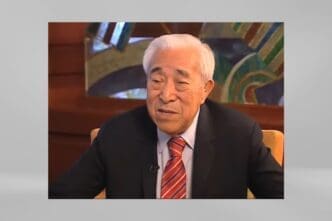Gyalo Thondup, the elder brother of the Dalai Lama and a prominent advocate for Tibetan autonomy, has died at the age of 97. He was instrumental in initiating discussions between Tibetans and Chinese authorities.
Gyalo Thondup passed away at his residence in Kalimpong, a town nestled in the Himalayan foothills of eastern West Bengal, India. His death was reported by Tibetan media outlets, which acknowledged his significant contributions to the Tibetan cause and his remarkable international networking efforts.
Thondup was recognized for his diplomatic endeavors, particularly his role in facilitating ties between Tibetan leadership and foreign governments, including the United States. He was credited with encouraging U.S. support for Tibet and fostering early interactions with the Indian government, including crucial discussions with India’s first Prime Minister, Jawaharlal Nehru, during the Dalai Lama’s escape to India in 1959.
In keeping with Buddhist customs, a prayer session was conducted by the Dalai Lama in Bylakuppe, Karnataka, where he is currently residing. The spiritual leader expressed gratitude for Thondup’s substantial efforts toward the Tibetan struggle and prayed for his ‘swift rebirth.’
Thondup, who made India his home in 1952, was the elder sibling among six brothers and sisters of the Dalai Lama. Unlike his siblings, he was not prepared for a monastic life. Instead, he dedicated much of his life to the Tibetan cause, serving as the chairman of the exiled Tibetan government in India from 1991 to 1993. His tenure was marked by an extensive engagement with international stakeholders, striving for Tibetan autonomy through dialogue.
Notably, in 1979, Thondup initiated a significant shift in strategy by encouraging direct talks with Chinese authorities. This marked a departure from earlier efforts that supported armed resistance. In a 2003 interview, Thondup explained that neither the United States nor India could solve the Tibetan issue, and emphasized that solutions would only emerge from direct negotiations with Beijing.
Thondup’s legacy as a pragmatic and determined leader who sought peaceful resolutions to the Tibetan struggle remains influential. His passing marks the end of an era for Tibetan diplomacy, yet his achievements continue to inspire those who strive for Tibetan autonomy and peace.








